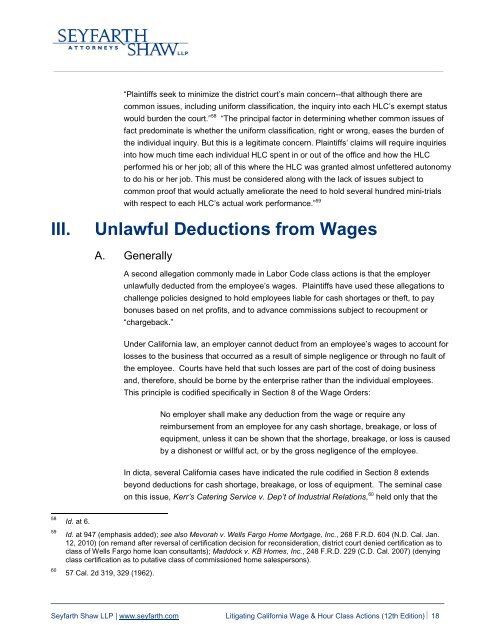Litigating California Wage & Hour and Labor Code Class Actions
Litigating California Wage & Hour and Labor Code Class Actions
Litigating California Wage & Hour and Labor Code Class Actions
You also want an ePaper? Increase the reach of your titles
YUMPU automatically turns print PDFs into web optimized ePapers that Google loves.
“Plaintiffs seek to minimize the district court’s main concern--that although there are<br />
common issues, including uniform classification, the inquiry into each HLC’s exempt status<br />
would burden the court.” 58 “The principal factor in determining whether common issues of<br />
fact predominate is whether the uniform classification, right or wrong, eases the burden of<br />
the individual inquiry. But this is a legitimate concern. Plaintiffs’ claims will require inquiries<br />
into how much time each individual HLC spent in or out of the office <strong>and</strong> how the HLC<br />
performed his or her job; all of this where the HLC was granted almost unfettered autonomy<br />
to do his or her job. This must be considered along with the lack of issues subject to<br />
common proof that would actually ameliorate the need to hold several hundred mini-trials<br />
with respect to each HLC’s actual work performance.” 59<br />
III.<br />
Unlawful Deductions from <strong>Wage</strong>s<br />
A. Generally<br />
A second allegation commonly made in <strong>Labor</strong> <strong>Code</strong> class actions is that the employer<br />
unlawfully deducted from the employee’s wages. Plaintiffs have used these allegations to<br />
challenge policies designed to hold employees liable for cash shortages or theft, to pay<br />
bonuses based on net profits, <strong>and</strong> to advance commissions subject to recoupment or<br />
“chargeback.”<br />
Under <strong>California</strong> law, an employer cannot deduct from an employee’s wages to account for<br />
losses to the business that occurred as a result of simple negligence or through no fault of<br />
the employee. Courts have held that such losses are part of the cost of doing business<br />
<strong>and</strong>, therefore, should be borne by the enterprise rather than the individual employees.<br />
This principle is codified specifically in Section 8 of the <strong>Wage</strong> Orders:<br />
No employer shall make any deduction from the wage or require any<br />
reimbursement from an employee for any cash shortage, breakage, or loss of<br />
equipment, unless it can be shown that the shortage, breakage, or loss is caused<br />
by a dishonest or willful act, or by the gross negligence of the employee.<br />
In dicta, several <strong>California</strong> cases have indicated the rule codified in Section 8 extends<br />
beyond deductions for cash shortage, breakage, or loss of equipment. The seminal case<br />
on this issue, Kerr’s Catering Service v. Dep’t of Industrial Relations, 60 held only that the<br />
58<br />
59<br />
60<br />
Id. at 6.<br />
Id. at 947 (emphasis added); see also Mevorah v. Wells Fargo Home Mortgage, Inc., 268 F.R.D. 604 (N.D. Cal. Jan.<br />
12, 2010) (on rem<strong>and</strong> after reversal of certification decision for reconsideration, district court denied certification as to<br />
class of Wells Fargo home loan consultants); Maddock v. KB Homes, Inc., 248 F.R.D. 229 (C.D. Cal. 2007) (denying<br />
class certification as to putative class of commissioned home salespersons).<br />
57 Cal. 2d 319, 329 (1962).<br />
Seyfarth Shaw LLP | www.seyfarth.com <strong>Litigating</strong> <strong>California</strong> <strong>Wage</strong> & <strong>Hour</strong> <strong>Class</strong> <strong>Actions</strong> (12th Edition) 18
















